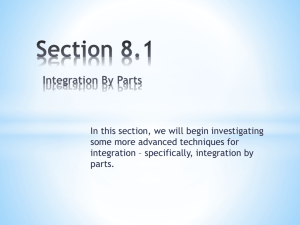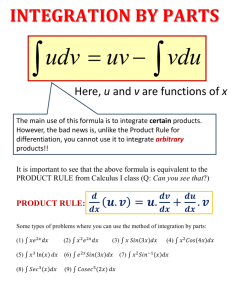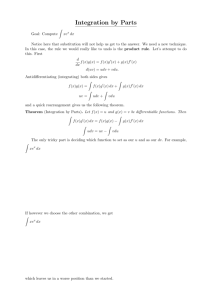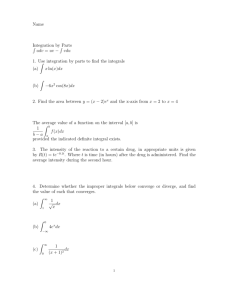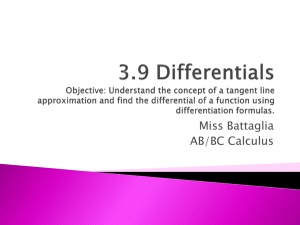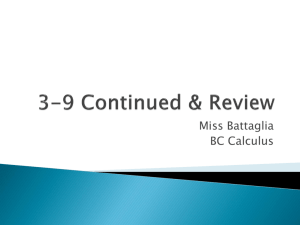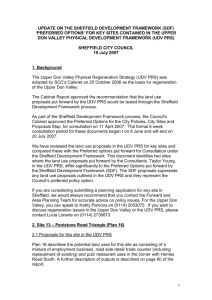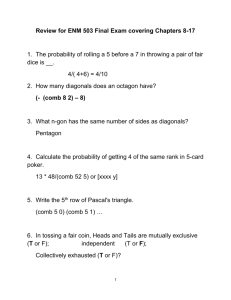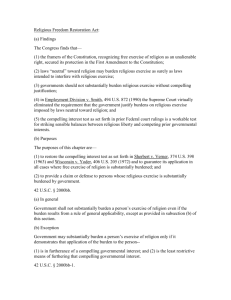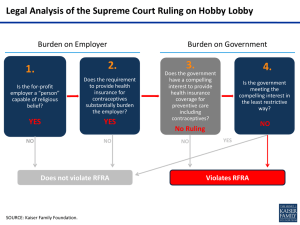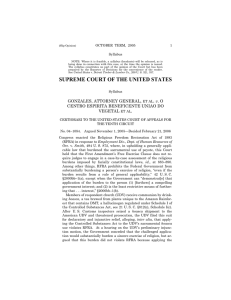Gonzales v. O Centro Espirita (2006)
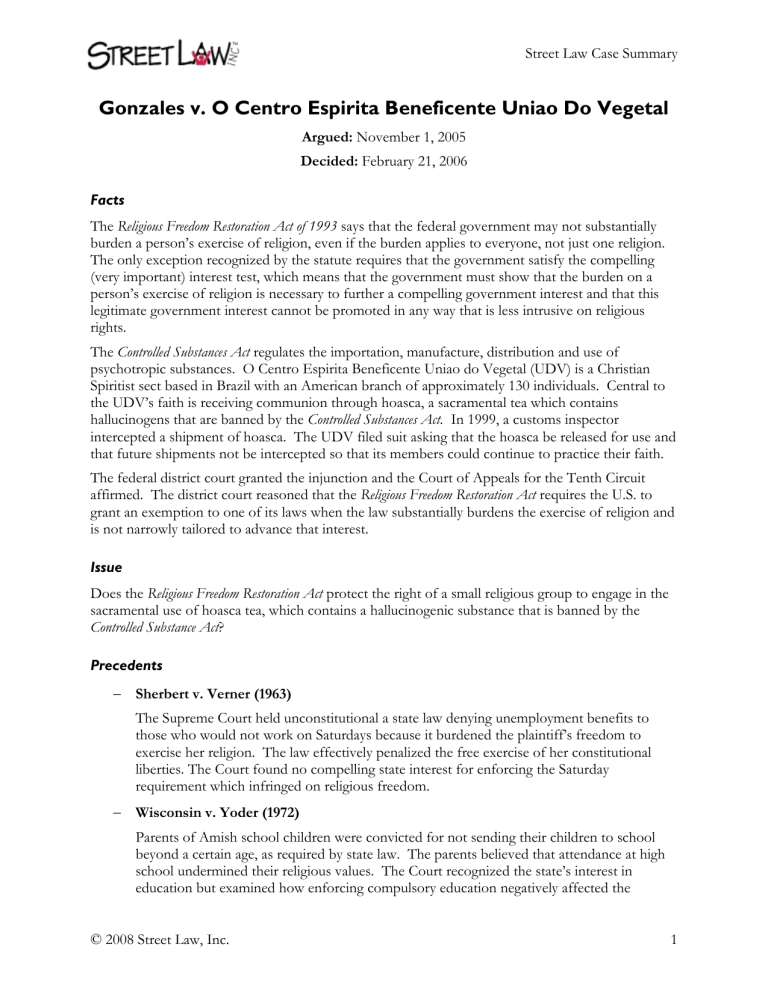
Street Law Case Summary
Gonzales v. O Centro Espirita Beneficente Uniao Do Vegetal
Argued: November 1, 2005
Decided: February 21, 2006
Facts
The Religious Freedom Restoration Act of 1993 says that the federal government may not substantially burden a person’s exercise of religion, even if the burden applies to everyone, not just one religion.
The only exception recognized by the statute requires that the government satisfy the compelling
(very important) interest test, which means that the government must show that the burden on a person’s exercise of religion is necessary to further a compelling government interest and that this legitimate government interest cannot be promoted in any way that is less intrusive on religious rights.
The Controlled Substances Act regulates the importation, manufacture, distribution and use of psychotropic substances. O Centro Espirita Beneficente Uniao do Vegetal (UDV) is a Christian
Spiritist sect based in Brazil with an American branch of approximately 130 individuals. Central to the UDV’s faith is receiving communion through hoasca, a sacramental tea which contains hallucinogens that are banned by the Controlled Substances Act. In 1999, a customs inspector intercepted a shipment of hoasca. The UDV filed suit asking that the hoasca be released for use and that future shipments not be intercepted so that its members could continue to practice their faith.
The federal district court granted the injunction and the Court of Appeals for the Tenth Circuit affirmed. The district court reasoned that the Religious Freedom Restoration Act requires the U.S. to grant an exemption to one of its laws when the law substantially burdens the exercise of religion and is not narrowly tailored to advance that interest.
Issue
Does the Religious Freedom Restoration Act protect the right of a small religious group to engage in the sacramental use of hoasca tea, which contains a hallucinogenic substance that is banned by the
Controlled Substance Act?
Precedents
Sherbert v. Verner (1963)
The Supreme Court held unconstitutional a state law denying unemployment benefits to those who would not work on Saturdays because it burdened the plaintiff’s freedom to exercise her religion. The law effectively penalized the free exercise of her constitutional liberties. The Court found no compelling state interest for enforcing the Saturday requirement which infringed on religious freedom.
Wisconsin v. Yoder (1972)
Parents of Amish school children were convicted for not sending their children to school beyond a certain age, as required by state law. The parents believed that attendance at high school undermined their religious values. The Court recognized the state’s interest in education but examined how enforcing compulsory education negatively affected the
© 2008 Street Law, Inc. 1
McCutcheon v. Federal Elections Commission religious right of the parents. Because the Amish were gainfully employed and did not break the law, the Court granted the Amish parents an exemption to the state law.
Arguments for Gonzales
There are at least three compelling state interests that justify enforcing the Controlled
Substances Act’s prohibition on DMT a.
Protecting the health and safety of UDV members b.
Addressing the risks of possible diversion of the drug to recreational use c.
Having uniform application of drug laws
The blanket prohibition on DMT, with no exceptions, is the least restrictive means of furthering the state’s interests because it applies to everyone.
Studies show that the use of DMT is dangerous. It leads to heart problems, breathing problems, intestinal cramps, vomiting, diarrhea and fainting.
There is significant potential for abuse of DMT, and there is a potential that it could be used for purposes other than religious purposes if it is lost or stolen.
Creating exceptions to drug laws weakens those laws and makes them harder to enforce.
Federal drug laws protect citizens and uniform application of these laws is needed.
Arguments for UDV
Government interest is not compelling a.
The only study aimed at documenting the health effects of hoasca in a religious setting found no significant health problems. b.
During the time that UDV has used hoasca, it has never been diverted or abused. c.
250,000 members of the Native American Church are exempt from drug laws so that they can use peyote in religious ceremonies. There is no evidence that the 130 members of UDV will abuse the exception or create more risk than the members of the Native
American Church.
The government has not used the least restrictive means to achieve its interests. To determine whether this is the least restrictive means the Court must look to the burden on the person (i.e. the individual members of UDV). Granting an exception to the 130 members of UDV would be the least restrictive means of achieving the government’s interest in uniform application of drug laws because the religious freedom of UDV’s members would not be restricted, but the exception is small enough to avoid threatening the application and enforcement of drug laws.
There are already exceptions to drug laws for the use of peyote for religious purposes. If the government was concerned about the uniform application of drug laws then it would not have allowed those exceptions.
© 2008 Street Law, Inc. 2
McCutcheon v. Federal Elections Commission
Decision
Chief Justice Roberts wrote the opinion and all other members joined. Justice Alito took no part in the decision of the case.
The Supreme Court ruled in favor of UDV and held that the government failed to demonstrate a compelling interest in barring the UDV’s sacramental use of hoasca. The Court reasoned that the government bore the burden of proof and had to demonstrate a compelling interest that justified restricting the religious freedom of UDV. Taking context into account, the Court reasoned that granting an exemption to a group of 130 UDV members would not substantially impair the application of the federal drug law. The Court also pointed to the fact that exemptions exist for peyote, which contains mescaline, and that exemption doesn’t seem to be affecting the uniform application of drug laws in the way that the government claims granting an exemption in this case would. The Court concluded that the government failed to carry the burden placed on it by the
Religious Freedom Restoration Act and affirmed the grant of the preliminary injunction allowing UDV to continue its use of hoasca for religious ceremonies.
© 2008 Street Law, Inc. 3
